TO
| Creator | Title | Description | Subject | Date | ||
|---|---|---|---|---|---|---|
| 1 |
 | Horch, Kenneth W.; Normann, Richard A. | Noble metal penetrating cortical stimulating electrode array: preliminary results | Electrical stimulation of the visual cortex causes subjects to see spots of light (phosphenes) in their visual fields. We have developed arrays of penetrating electrodes which may from the basis of a visual prosthesis centered around electrical stimulation of the visual cortex. These arrays have bee... | Visual prosthesis | 1988 |
| 2 |
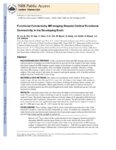 | Gerig, Guido | Functional connectivity MR imaging reveals cortical functional connectivity in the developing brain | BACKGROUND AND PURPOSE: Unlike conventional functional MR imaging where external sensory/cognitive paradigms are needed to specifically activate different regions of the brain, resting functional connectivity MR imaging acquires images in the absence of cognitive demands (a resting condition) and de... | 2008-01-01 | |
| 3 |
 | Mathews, V. John | A new model of perceptual threshold functions for application in image compression systems | This paper discusses the development of a perceptual threshold model for the human visual system. The perceptual threshold functions describe the levels of distortions present at each location in an image that human observers can not detect. Models of perceptual threshold functions are useful in ima... | 1995 | |
| 4 |
 | Shirley, Peter S. | Natural image statistics for computer graphics | The class of all natural images is an infinitely small fraction of all possible images. The structure of natural images can be statistically modeled, revealing striking regularities. The human visual system appears to be optimized to view natural images, as opposed to any possible image, and therefo... | Natural image | 2001 |
| 5 |
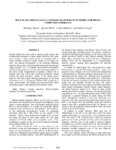 | Mathews, V. John | Neural decoding using a nonlinear generative model for brain-computer interface | Kalman filters have been used to decode neural signals and estimate hand kinematics in many studies. However, most prior work assumes a linear system model, an assumption that is almost certainly violated by neural systems. In this paper, we show that adding nonlinearities to the decoding algorithm ... | 2014-01-01 | |
| 6 |
 | Baxter, Brent S. | Image processing in the human visual system | This work extends the multiplicative visual model to include image texture as suggested by experiments [Campbell, Weisel] linking a low resolution Fourier analysis with neurons in certain parts of the visual cortex. The new model takes image texture into account in the sense that weak texture is acc... | Human visual system; Image texture | 1975 |
| 7 |
 | Mathews, V. John | Subband vector quantization of images using hexagonal filter banks | Abstract Results of psychophysical experiments on human vision conducted in the last three decades indicate that the eye performs a multichannel decomposition of the incident images. This paper presents a subband vector quantization algorithm that employs hexagonal filter banks. The hexagonal filte... | 1992 | |
| 8 |
 | Mathews, V. John | An optimal design procedure for intraband vector quantized subband coding | AbstTact- Subband coding with vector quantization is addressed in this paper. Forming the data vectors from both between and within the subbands is considered. The former of these two schemes is referred to as interband coding and the latter as intraband coding. Interband coder design is relatively ... | 1995 | |
| 9 |
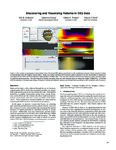 | Anderson, Erik Wesley | Discovering and visualizing patterns in EEG data | Brain activity data is often collected through the use of electroen-cephalography (EEG). In this data acquisition modality, the electric fields generated by neurons are measured at the scalp. Although this technology is capable of measuring activity from a group of neurons, recent efforts provide ev... | 2013-01-01 | |
| 10 |
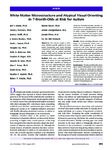 | Gerig, Guido | White matter microstructure and atypical visual orienting in 7 month-olds at risk for autism | Objective: The authors sought to determine whether specific patterns of oculo-motor functioning and visual orientingcharacterize 7-month-old infants who later meet criteria for an autism spectrum disorder (ASD) and to identify the neural correlates of these behaviors. Method:Data were collected from... | 2013-01-01 | |
| 11 |
 | Faugeras, Olivier Dominique | Digital color image processing and psychophysics within the framework of a human visual model | A three-dimensional homomorphic model of human color vision based on neurophysiological and psychophysical evidence is presented. This model permits the quantitative definition of perceptually important parameters such as brightness. saturation, huo and strength. By modelling neural interaction in t... | Human visual model; Neurophysiological evidence; Psychophysical evidence | 1977 |
| 12 |
 | Harrison, Reid R. | Versatile integrated circuit for the acquisition of biopotentials | Electrically active cells in the body produce a wide variety of voltage signals that are useful for medical diagnosis and scientific investigation. These biopotentials span a wide range of amplitudes and frequencies. We have developed a versatile front-end integrated circuit that can be used to amp... | Biopotential; Neural recording; Electrodes; Amplifier | 2007-09 |
| 13 |
 | Gerig, Guido | Early postnatal development of corpus callosum and corticospinal white matter assessed with quantitative tractography | BACKGROUND AND PURPOSE: The early postnatal period is perhaps the most dynamic phase of white matter development. We hypothesized that the early postnatal development of the corpus callosum and corticospinal tracts could be studied in unsedated healthy neonates by using novel approaches to diffusion... | 2007-01-01 | |
| 14 |
 | Harrison, Reid R. | HermesC: low-power wireless neural recording system for freely moving primates | Neural prosthetic systems have the potential to restore lost functionality to amputees or patients suffering from neurological injury or disease. Current systems have primarily been designed for immobile patients, such as tetraplegics functioning in a rather static, carefully tailored environment.... | Brain-machine interface; Low power; Neural prosthetics; Telemetry; Wireless; Neural recording; HermesC | 2009-08 |
| 15 |
 | Tasdizen, Tolga; Jones, Bryan W.; Whitaker, Ross T. | Computational framework for ultrastructural mapping of neural circuitry | Circuitry mapping of metazoan neural systems is difficult because canonical neural regions (regions containing one or more copies of all components) are large, regional borders are uncertain, neuronal diversity is high, and potential network topologies so numerous that only anatomical ground truth c... | 2009 | |
| 16 |
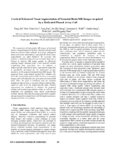 | Gerig, Guido | Cortical enhanced tissue segmentation of neonatal brain MR images acquired by a dedicated phased array coil | The acquisition of high quality MR images of neonatal brains is largely hampered by their characteristically small head size and low tissue contrast. As a result, subsequent image processing and analysis, especially for brain tissue segmentation, are often hindered. To overcome this problem, a dedic... | 2009-01-01 | |
| 17 |
 | Lefohn, Aaron; Cates, Joshua E.; Whitaker, Ross T. | Interactive, GPU-based level sets for 3D brain tumor segmentation | While level sets have demonstrated a great potential for 3D medical image seg- mentation, their usefulness has been limited by two problems. First, 3D level sets are relatively slow to compute. Second, their formulation usually entails several free parameters which can be very difficult to correc... | Level sets; Medical imaging; 3D brain tumor segmentation | 2003-04-16 |
| 18 |
 | Lefohn, Aaron; Kniss, Joe; Hansen, Charles D.; Whitaker, Ross T. | Interactive deformation and visualization of level set surfaces using graphics hardware | Deformable isosurfaces, implemented with level-set methods, have demonstrated a great potential in visualization for applications such as segmentation, surface process- ing, and surface reconstruction. Their usefulness has been limited, however, by two problems. First, 3D level sets are relativel... | Interactive deformation; Deformable isosurfaces; Level-set methods | 2003-04-16 |
| 19 |
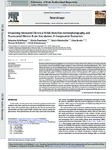 | Dannhauer, Moritz | Visualizing simulated electrical fields from electroencephalography and transcranial electric brain stimulation: a comparative evaluation | Electrical activity of neuronal populations is a crucial aspect of brain activity. This activity is not measured directly but recorded as electrical potential changes using head surface electrodes (electroencephalogram - EEG). Head surface electrodes can also be deployed to inject electrical current... | 2014-01-01 | |
| 20 |
 | Hansen, Charles D.; Whitaker, Ross T. | Interactive deformation and visualization of level set surfaces using graphics hardware | Deformable isosurfaces, implemented with level-set methods, have demonstrated a great potential in visualization for applications such as segmentation, surface processing, and surface reconstruction. Their usefulness has been limited, however, by their high computational cost and and reliance on sig... | Deformation; Level sets; Deformable models; Image segmentation; Volume visualization; GPU; Streaming computation; Isosurfaces | 2003 |
| 21 |
 | Horch, Kenneth W. | Microfabricated cylindrical multielectrodes for neural stimulation | The effects of spinal cord injuries are likely to be ameliorated with the help of functional electrical stimulation of the spinal cord, a technique that may benefit from a new style of electrode: the cylindrical multielectrode. This paper describes the specifications for, fabrication techniques for... | Cylindrical multielectrode; Depth electrodes; Impedance testing; Microelectromechanical systems (MEMS); Microstimulation; Impedance testing; Neural prosthesis | 2006-02 |
| 22 |
 | Cates, Joshua E.; Lefohn, Aaron; Whitaker, Ross T. | GIST: an interactive, GPU-based level set segmentation tool for 3D medical images | While level sets have demonstrated a great potential for 3D medical image segmentation, their usefulness has been limited by two problems. First, 3D level sets are relatively slow to compute. Second, their formulation usually entails several free parameters which can be very difficult to correctl... | GIST; 3D medical images; Segmentation tool; Image segmentation | 2004-02-27 |
| 23 |
 | Kindlmann, Gordon | Visualization and analysis of diffusion tensor fields | The power of medical imaging modalities to measure and characterize biological tissue is amplified by visualization and analysis methods that help researchers to see and understand the structures within their data. Diffusion tensor magnetic resonance imaging can measure microstructural properties... | diffusion tensor fields; Visualization; medical imaging | 2004-09-28 |
| 24 |
 | Horch, Kenneth W. | Proposed specifications for a lumbar spinal cord electrode array for control of lower extremities in paraplegia | The goal of the study was to provide specifications for a stimulating electrode array to be implanted in the lumbosacral spinal cord as part of a functional neuromuscular stimulation (FNS) system for control of lower extremity muscles in paralyzed individuals. Dual channel stimulation of the qua... | Stimulating electrode array; FNS; Functional neuromuscular stimulation | 1997 |
| 25 |
 | Hansen, Charles D. | Gaussian transfer functions for multi-field volume visualization | Volume rendering is a flexible technique for visualizing dense 3D volumetric datasets. A central element of volume rendering is the conversion between data values and observable quantities such as color and opacity. This process is usually realized through the use of transfer functions that are prec... | Volume rendering; Transfer functions; Volume visualization | 2003 |
